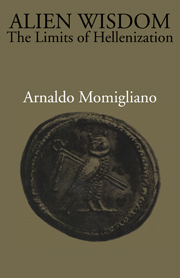Book contents
- Frontmatter
- Contents
- Per mia madre, presente sempre nel suo vigilc amore
- Preface
- 1 The Greeks and their neighbours in the Hellenistic world
- 2 Polybius and Posidonius
- 3 The Celts and the Greeks
- 4 The Hellenistic discovery of Judaism
- 5 Greeks, Jews and Romans from Antiochus III to Pompey
- 6 Iranians and Greeks
- Select Bibliography
- Index of Names
1 - The Greeks and their neighbours in the Hellenistic world
Published online by Cambridge University Press: 01 June 2011
- Frontmatter
- Contents
- Per mia madre, presente sempre nel suo vigilc amore
- Preface
- 1 The Greeks and their neighbours in the Hellenistic world
- 2 Polybius and Posidonius
- 3 The Celts and the Greeks
- 4 The Hellenistic discovery of Judaism
- 5 Greeks, Jews and Romans from Antiochus III to Pompey
- 6 Iranians and Greeks
- Select Bibliography
- Index of Names
Summary
The philosophic historian will never stop meditating on the nose of Cleopatra. If that nose had pleased the gods as it pleased Caesar and Antony, a loose Alexandrian gnosticism might have prevailed instead of the Christian discipline imposed by the two Romes, the old one on the Tiber, and the new one on the Bosporus. The Celts would have been allowed to go on collecting mistletoe in their forests. We would have fewer books on Queen Cleopatra and on King Arthur, but even more books on Tutankhamen and on Alexander the Great. But a Latin-speaking Etruscologist, not a Greek-speaking Egyptologist, brought to Britain the fruits of the victory of Roman imperialism over the Hellenistic system. We must face the facts.
The victory of Roman imperialism can in its turn be described as the result of four factors: the new direction given by Rome to the social – that is the military – forces of old Italy; the utter inability of any Hellenistic army to match the Romans in the field; the painful erosion of Celtic civilization and its appendages which went on for centuries and ultimately enabled the Romans to control the resources of western Europe from the Atlantic to the Danubian regions; and finally the co-operation of Greek intellectuals with Italian politicians and writers in creating a new bilingual culture which gave sense to life under Roman rule.
- Type
- Chapter
- Information
- Alien WisdomThe Limits of Hellenization, pp. 1 - 21Publisher: Cambridge University PressPrint publication year: 1975



